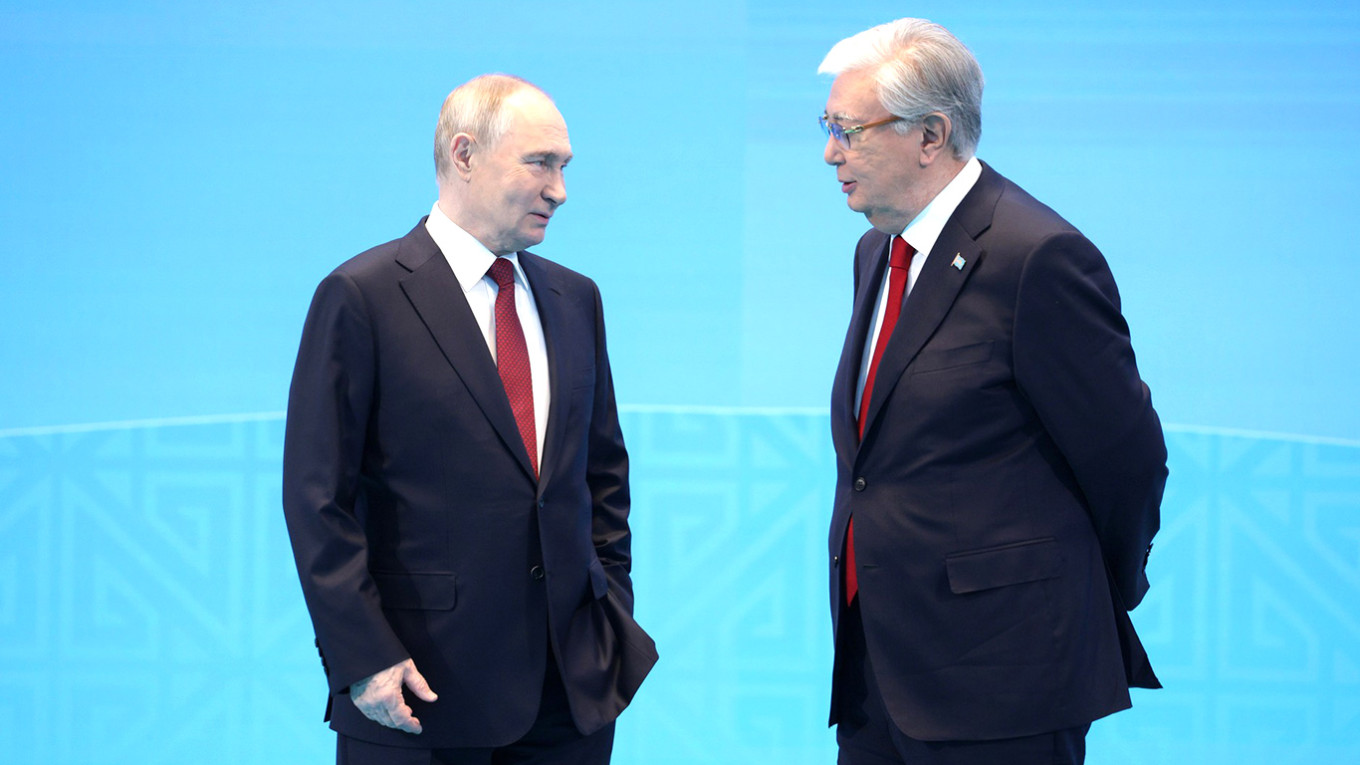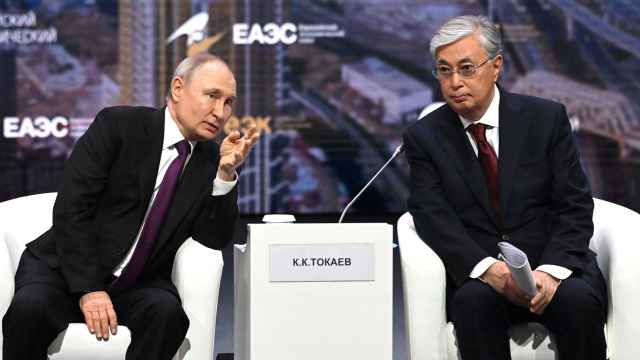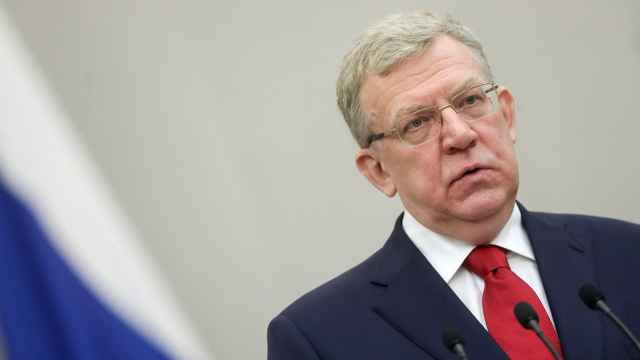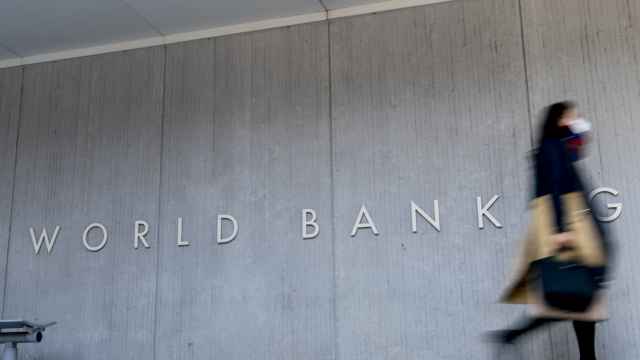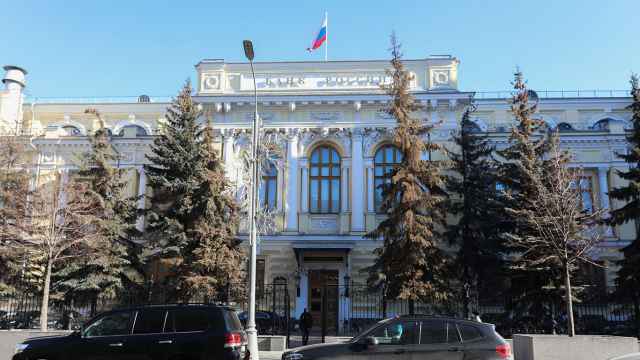Last week, Russian President Vladimir Putin attended a summit for the Collective Security Treaty Organization in Astana. However, for some Kazakhs, the Russian president’s presence in the country’s capital was overshadowed by the plummeting exchange rate of the Kazakh tenge against the U.S. dollar. The tenge tracked the ruble in its decline following the recently imposed sanctions against Gazprombank, a Russian state-owned bank that facilitates the trade of hydrocarbons and other resources, making it a major source of foreign currency for the Kremlin until recently. Last week alone the tenge lost 2.6% in value against the dollar.
It is not the first time the tenge experienced a sharp decline as a consequence of U.S. sanctions against Russia – earlier this year the Kazakh currency devalued almost 5% in less than three weeks following the Moscow Exchange suspending trade in dollars and euros after being hit by U.S. sanctions. Since then, the ruble is effectively a non-floating currency with the exchange rate formally determined over-the-counter and informally by Russia’s Central Bank and Ministry of Finance. The Kazakh tenge on the other hand is still floating. There is a caveat though – the ruble has largely remained in the band of 4.8 to 5.5 tenge per ruble in the past year supported by bilateral trade governed by the Eurasian Economic Union (EAEU).
So, what is the EAEU? Established in 2015, the bloc superseded the Eurasian Customs Union and was touted by Moscow as the region’s counterpart to the European Union.
However, unlike the EU, the EAEU has done little to achieve true economic integration that benefits all member states, which include Kazakhstan, Russia, Belarus, Armenia, and Kyrgyzstan. While the two largest economies of the EU, France and Germany, comprise just over 40% of the EU’s GDP, Russia makes up over 80% of the EAEU’s combined economy. It uses its outsized position in the union to pursue its own goals oftentimes with little regard to the interests of other members.
Considering the Russian full-scale invasion of Ukraine, it should be abundantly clear that the Kremlin is willing to pursue its geopolitical ambitions at immense economic costs which are indirectly imposed on the non-warring EAEU members. When Russia launched the full-scale invasion of Ukraine, Alibek Kuantyrov, the then Kazakh National Economy Minister, quickly pointed out that the war in Ukraine could have a negative impact on the Kazakh economy.
Perhaps, the EAEU’s true nature is best encapsulated by Kataryna Wolczuk of Chatham House: “Moscow created the EAEU as a vehicle to reverse Russia’s loss of power in the region following the demise of the Soviet Union, rather than to pursue deep economic integration with smaller states.”
The Moscow-centric EAEU is consequently used by the Kremlin as a soft-power tool to extract political and economic gains from member states. Russia frequently disregards the organization’s rules and supersedes its governing bodies in trade negotiations, as was the case with Putin agreeing to “connect the initiative of the construction of the Silk Road Economic Belt put forward by the Chinese side with the construction of the Eurasian Economic Union of the Russian side” in a 2015 meeting with China’s Xi Jinping, with no prior consultation with any members of the EAEU. Ironically, China and Kazakhstan finished their parts of the highway planned to connect China with Europe, leaving Russia as the only country failing to fulfill their obligation. In 2022 Russia decided to reroute the highway through Iran.
In other instances, Russia used the EAEU as an economic extortion scheme. In 2014 Russia used EAEU’s antecedent organization, the Customs Union, to pressure Belarus into aiding Russia in sanctions circumvention, imposed following the occupation of Crimea. At the time Russia banned Belarusian agricultural imports produced by 23 companies. In 2016, Putin unilaterally banned the transit of Ukrainian goods through Russia to Kazakhstan slashing Ukrainian exports to the country by 45.5%. Russia also frequently imposes unilateral non-tariff trade limitations against Kazakh companies either as a protectionist measure or as an economic pressure tool while de jure fulfilling its duties under the terms of the EAEU.
However, not all EAEU terms are beneficial to Kazakhstan. EAEU standards and requirements are often optimized for Russian producers or simply set at levels that are prohibitively costly to abide by for companies in other member states. Russian companies typically don’t get punished for standards violations.
Moreover, the EAEU’s protectionist measures overwhelmingly benefit Russian firms. Almas Chukin, a member of the Council for the Kazakh National Economy Ministry, points out: “With the emergence of the Customs Union we do not have an independent customs policy. We received many non-tariff restrictions on foreign trade with preferences given to our partners but not to the rest of the world … Protectionist duties on foreign goods entering the EAEU have made our lives more expensive.”
Perhaps one of the most absurd terms of the EAEU treaty is on the distribution of import customs duties, especially in light of the events of the past three years. All goods imported into the EAEU are subject to import duties, and the collected duties are pooled regardless of where in the union they enter. 85% of the pool is awarded to Russia, 6.9% to Kazakhstan.
Conceivably, the arrangement made sense before 2022. However, after the introduction of Western sanctions, Russia’s imports dropped sharply while Kazakhstan’s imports steadily increased. This translates to Kazakhstan and other members of the EAEU subsidizing Russia’s budget through the EAEU’s collection of import customs duties.
Finally, the most relevant argument against Kazakhstan’s continued membership in EAEU is that by nature the economies of Russia and Kazakhstan do not complement each other.
President Kassym-Jomart Tokayev’s remarks at November’s summit, that Kazakhstan and Russia should not compete against each other in the EAEU’s domestic markets, in the opening paragraph acknowledges what has been known to the Kazakh government since the inception of the union: Russia and Kazakhstan are direct competitors in global markets. Both economies are heavily dependent on the exports of hydrocarbons and other natural resources. One of the few notable ways they are complementary is in the nuclear energy sector, where Kazakhstan is the largest uranium producer in the world and Russia possesses the largest uranium enrichment capacity in the world. However, there too the terms are skewed in Russia’s favor. Rosatom acquired the largest uranium mine in the world in Kazakhstan, while Kazakhstan has no ownership in enrichment facilities in Russia.
The continued isolation of Russia and the Kremlin’s acceptance of incurring ever-increasing sanctions as a consequence of their imperial pursuits pose significant economic risks for Kazakhstan. Membership in EAEU pre-2022 had some rationale especially considering that 80% of Kazakh oil exports traveled to the global markets through the Caspian Pipeline Consortium (CPC) in Russia.
However, with China overtaking Russia as Kazakhstan’s primary trade partner and the Kazakh government taking active steps to reduce the country’s dependence on the CPC pipeline, there are viable conditions for an EAEU exit. Moreover, the tenge’s exchange rate shocks discussed earlier highlight the unfavorable transfer of risks from Russia to Kazakhstan. The threat of sanctions should also not be forgotten – in an interview with Izvestiya, French MEP Thierry Mariani stated that Kazakhstan as a member of the EAEU could be subjected to secondary sanctions. Secondary sanctions would be catastrophic for the Kazakh economy and could push the country deeper into Moscow’s orbit.
A Message from The Moscow Times:
Dear readers,
We are facing unprecedented challenges. Russia's Prosecutor General's Office has designated The Moscow Times as an "undesirable" organization, criminalizing our work and putting our staff at risk of prosecution. This follows our earlier unjust labeling as a "foreign agent."
These actions are direct attempts to silence independent journalism in Russia. The authorities claim our work "discredits the decisions of the Russian leadership." We see things differently: we strive to provide accurate, unbiased reporting on Russia.
We, the journalists of The Moscow Times, refuse to be silenced. But to continue our work, we need your help.
Your support, no matter how small, makes a world of difference. If you can, please support us monthly starting from just $2. It's quick to set up, and every contribution makes a significant impact.
By supporting The Moscow Times, you're defending open, independent journalism in the face of repression. Thank you for standing with us.
Remind me later.



